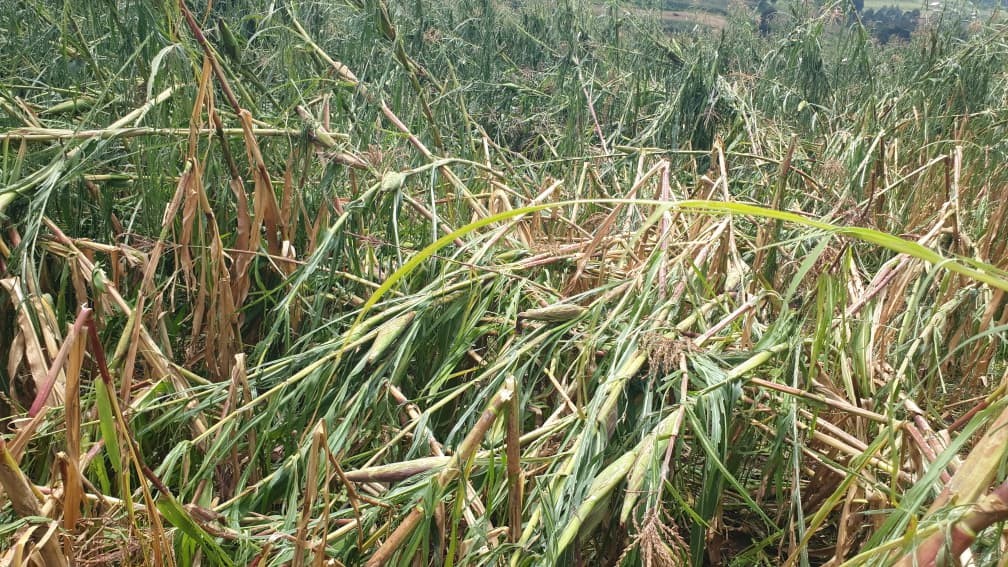KAPCHORWA, September 8, 2025 – Farmers in Kwoti Subcounty, Kapchorwa district, are counting heavy losses after a devastating hailstorm destroyed acres of crops on Saturday. The affected farmers, many of whom are beneficiaries of the government’s Parish Development Model [PDM], are now appealing for urgent support.
The PDM programme aims to transition Ugandans from subsistence farming to commercial agriculture. But for the farmers in Kwoti, this weekend’s storm has left their hopes in tatters.
What happened
According to locals, the storm struck without warning. Dark clouds quickly gathered, followed by heavy rainfall and hailstones that battered the region for several minutes. Crops such as maize, cabbage, and potatoes were left shredded or flattened. In some gardens, nothing was left standing.
“It was like stones falling from the sky,” said one distressed farmer. “I’ve lived here for years, but I’ve never seen such destruction. Most of us have lost everything.”
Farmers speak out
Many farmers had invested their PDM funds into this season’s planting, expecting to earn enough to support their families and improve their livelihoods.
Joel Salimo, a mother of three, described her heartbreak: “I used the PDM money to plant maize and cabbage. I was planning to use the harvest to pay school fees and repair my house. Now, everything is gone. The hailstones tore through the leaves and snapped the stems. I don’t know where to begin.”
Samson Cheptegei, another farmer, shared similar anguish: “I borrowed money from our cooperative because I was confident my potatoes would fetch a good price. Today, my farm looks like it was swept by fire. I have nothing left and no way to repay the loan.”
Sarah Chebet, who grows maize and potatoes, added: “I was hoping to store food for my family, but now all my potatoes have rotted in the soil due to the excess water. I fear we’ll go hungry.”
Why this matters
Launched in 2022, the PDM is designed to lift rural households out of poverty by providing capital to boost agricultural production. In Kapchorwa, many used the funds to plant high-yield crops with the hope of breaking the cycle of poverty.
For these farmers, the damage is not just about lost crops—it’s about lost dreams and mounting debts. Without assistance, many may sink deeper into financial hardship.
Farmers’ demands
The affected farmers are urgently calling on the government to intervene with: New seeds, fertilisers, and farm tools; machinery and tractors to help prepare land before the planting season ends; emergency relief food to sustain families at risk of hunger; financial assistance or compensation, especially for those who borrowed money, and insurance programmes to protect farmers from future disasters
“We can rebuild, but not on our own,” Cheptegei emphasised. “We need seeds, fertilisers, and maybe even some money. If nothing is done, many families will suffer.”
The bigger picture
Experts warn that such extreme weather events are becoming more common due to climate change. While rains used to be predictable, farmers now face an increasing risk of floods, droughts, and hailstorms.
This unpredictability is particularly dangerous for smallholder farmers who depend entirely on rain-fed agriculture. Without access to irrigation, crop insurance, or savings, one storm can push an entire family into poverty.
Many leaders and experts are now calling for increased government investment in climate-smart agriculture to build resilience against such shocks.
As Kapchorwa waits for a government response, the destroyed fields serve as a stark reminder of how vulnerable farming remains, and how critical the right support can be for rural transformation.
https://thecooperator.news/hailstorm-destroys-crops-leaving-zombo-farmers-in-despair/
Buy your copy of thecooperator magazine from one of our country-wide vending points or an e-copy on emag.thecooperator.news
